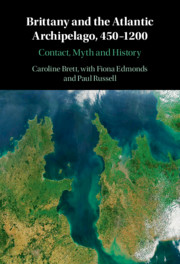Book contents
- Brittany and the Atlantic Archipelago, 450–1200
- Brittany and the Atlantic Archipelago, 450–1200
- Copyright page
- Contents
- Maps
- Tables
- Preface and Acknowledgements
- Abbreviations
- Additional material
- Introduction
- 1 Archaeology and the Origins of Brittany
- 2 Settlement and Isolation, 450–800
- 3 Brittany and Its Insular Past in the Ninth Century
- 4 Insular Contact and the Manuscript-Culture of Brittany in the Ninth and Tenth Centuries
- 5 From Invasion to Conquest: Brittany and Its History, 919–1066
- 6 Saints and Seaways: The Cult of Saints in Brittany and Its Archipelagic Links
- 7 Bretons and Britons in the Norman and Angevin Empires, 1066–1203
- Conclusion
- Bibliography
- Index
2 - Settlement and Isolation, 450–800
Published online by Cambridge University Press: 21 October 2021
- Brittany and the Atlantic Archipelago, 450–1200
- Brittany and the Atlantic Archipelago, 450–1200
- Copyright page
- Contents
- Maps
- Tables
- Preface and Acknowledgements
- Abbreviations
- Additional material
- Introduction
- 1 Archaeology and the Origins of Brittany
- 2 Settlement and Isolation, 450–800
- 3 Brittany and Its Insular Past in the Ninth Century
- 4 Insular Contact and the Manuscript-Culture of Brittany in the Ninth and Tenth Centuries
- 5 From Invasion to Conquest: Brittany and Its History, 919–1066
- 6 Saints and Seaways: The Cult of Saints in Brittany and Its Archipelagic Links
- 7 Bretons and Britons in the Norman and Angevin Empires, 1066–1203
- Conclusion
- Bibliography
- Index
Summary
The small amount of contemporary written evidence for the settlement of Brittany from Britain is discussed, in order to provide a context for the subsequent development of historical myths about Brittany. The theory of the settlement of a British military force in the peninsula by Roman authorities is evaluated and possible British and Continental contexts for such a movement in the fourth or fifth century are compared. In the sixth century the testimony of Gregory of Tours suggests that kingship was developing in Brittany along similar lines to Celtic Britain, but this development does not seem to have continued. Some reasons are suggested through comparison with rulership elsewhere in western Europe and the Atlantic Archipelago. The origins and significance of early regional units within Brittany that share names with regions in Britain (Domnonia and Cornubia) are discussed. The apparent isolation of Bretons (and Britons generally) from the rest of Western Christendom from the mid-seventh to the mid-eighth centuries finds an explanation in the ecclesiastical controversy over the date of Easter.
- Type
- Chapter
- Information
- Brittany and the Atlantic Archipelago, 450–1200 , pp. 68 - 99Publisher: Cambridge University PressPrint publication year: 2021

